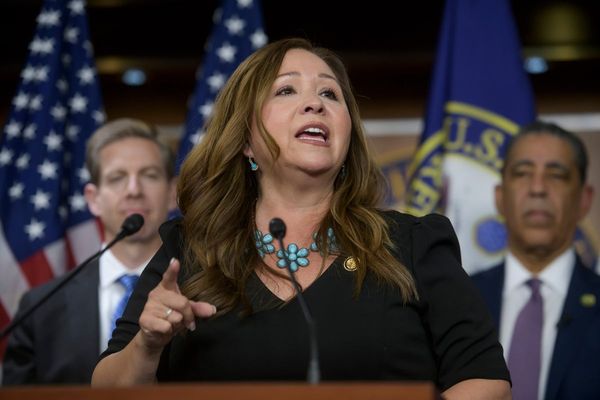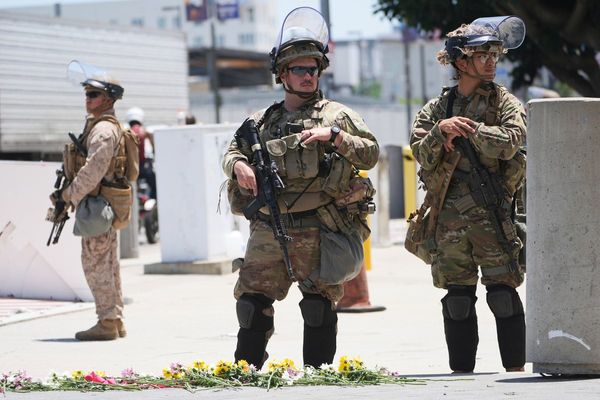
She has served pizzas and sold vacuum cleaners to pay the bills, almost lost her life in childbirth and lived on every continent but Antarctica. So taking on the British grocery market is only the latest challenge for Co-op boss Shirine Khoury-Haq.
She took the reins as the first female chief executive of the Co-operative Group – the venerable British institution that encompasses 2,400 convenience stores, funeral homes and insurance and legal services – in August 2022. The crisply spoken Beirut-born former accountant initially joined the group in August 2019 as finance director, just months before the pandemic hit.
Within that turmoil – during which her father died from the virus and she was dealing with twin daughters under five – Khoury-Haq quickly made her mark at the business, via a round of job cuts and efficiencies.
More recently, she has turned to growth, trying to broaden the mutual’s appeal to young people with pop-up shops at festivals and sponsorship of Co-op Live, a new arena in its Manchester homeland where the mutual’s 5 million members, who co-own the business via a trust, are getting first dibs on gig tickets before its opening in April.
Some may view the Co-op – owned by members rather than shareholders – as operating an outdated model, struggling to survive against supermarket heavyweights such as Tesco and Sainsbury’s. But Khoury-Haq sees the founding vision for the Co-op – which was set up in Rochdale, Lancashire, in 1844 as a way to ensure local people could access safe food and share in profits – as the key to its future success.
“Go back to the beginning and it was a disruptive organisation that broke the status quo. It is still that if you use it in the way intended,” she says. “Young people have interest in that. Older members have known it for long time.”
Khoury-Haq says the group is ready to shake up the grocery and funeral care markets as it goes on an expansion drive and tries to sign up millions more members – whether by offering tickets for Liam Gallagher or special discounts on milk and bread.
Khoury-Haq’s fundraising drive involved selling the group’s petrol forecourts business to Asda in 2022 for £600m. The Co-op had hacked back its debts to £123m by July last year, from more than £730m a year before, and is armed with more than £570m of cash on its balance sheet, according to those 2023 figures.
More efficiencies are on the cards, but Khoury-Haq says the group is not looking at any more large-scale redundancies after more than 400 head office jobs went in 2022.
The Co-op’s grocery shop empire already accounts for about a quarter of the UK’s convenience-store sector. That includes 2,400 of its own outlets, plus 5,000 others it supplies, including independent co-ops and independently run Nisa stores.
It is aiming to reach at least a 30% share of the market in the next few years and a similar figure this year for “quick commerce” – the rapidly expanding market for home delivery of groceries in under half an hour.
The Co-op believes its network of local stores will enable it to step in where the likes of rapid grocery delivery firms such as Weezy, Gorillas and Jiffy, funded by private equity, have failed.
There will be more grocery stores, including 440 more Nisa outlets and dozens more Co-op franchisees, but Khoury-Haq says the group will not just acquire sites to meet an arbitrary target.
She has warned that the Co-op’s full year profits are likely to fall back as it invests in cutting prices, joining Tesco and Sainsbury’s in trying to build loyalty by offering members special promotions rather than its traditional dividend payment.
Having moved out of running petrol stations, the group is looking at running stores for other operators or signing them up as franchise partners. It will also look at potentially extending its grocery wholesale business, funeral parlours and legal services.
“In funeral care, there is regulation coming through that will fundamentally change the sector and we’re seeing shifts in the market in terms of who is and is not able to keep up with the regulations,” says Khoury-Haq.
“We are looking at opportunities point by point,” she adds. “We’ve got teams that are scanning the markets. That’s the upside, if you can call it that, of tough economic times. There are opportunities out there for acquisitions, for growth. We’re very lucky in that our debt is low. Now we do have cash. And if opportunities arise, then we’re always on the lookout.”
Khoury-Haq relishes the challenge after a life which has made her an expert in overcoming adversity. She has said she felt she might never return to work after losing her first daughter, and almost dying in labour, after years of fertility treatment.
***
She was born to a Turkish mother and Palestinian father whose work in the oil industry took the family around the world. Khoury-Haq had lived on every continent but Antarctica by the age of 12, with stints in Turkey, Brazil and Australia.
She speaks five languages and went to university in Australia and the US, but worked for a long time in hospitality – including stints at Pizza Hut and McDonald’s – as she juggled work with academic study after her father lost his job.
She even sold vacuum cleaners while studying accountancy in the US before she became an executive at McDonald’s helping turn around underperforming franchises.
After completing a part-time MBA, she got a job at IBM and stayed with the technology firm when she moved to the UK to set up home with her second husband. She then moved to the Lloyd’s insurance market, where she was chief operating officer, before joining the Co-op.
Her ambitions for the group are in stark contrast with its fight for survival just over a decade ago, when it was brought to the brink by the near collapse of Co-op Bank. The bank was saved in 2013 by a hedge fund rescue, and the Co-op group sold its final 1% stake in the bank in 2017 for £5m. It has also sold off its farms, pharmacies and travel agencies.
But for all her ambition, Khoury-Haq admits the group faces continued headwinds. “We’re still not in stable times. I think consumers are still struggling with cost of living. Mortgage rates have gone up; interest rates have gone up.
“We have to manage our businesses to make sure that we are financially secure, that we are flexible, that we take care of our members and our wider customer base, and that we have both the operational financial flexibility so that if we have to make shifts, we’re able to do that.”
CV
Age 52
Family Married, twin daughters aged seven.
Education BComm in economics at Australian National University; MBA from Ohio State University; postgraduate management diploma at UWE Bristol.
Pay £750,000
Last holiday Turkey.
Best advice she’s been given “From my father – he always told me the stars are the limit, and I believed him!”
Biggest career mistake “No answer to this one. While some career episodes have been less than enjoyable, I have learned from every single one.”
Phrases she overuses “‘I’ve been thinking…’ It always elicits a groan from my team.”
How she relaxes “Chasing my children around, walking the dog and doing martial arts with my girls. I also love to read.”







